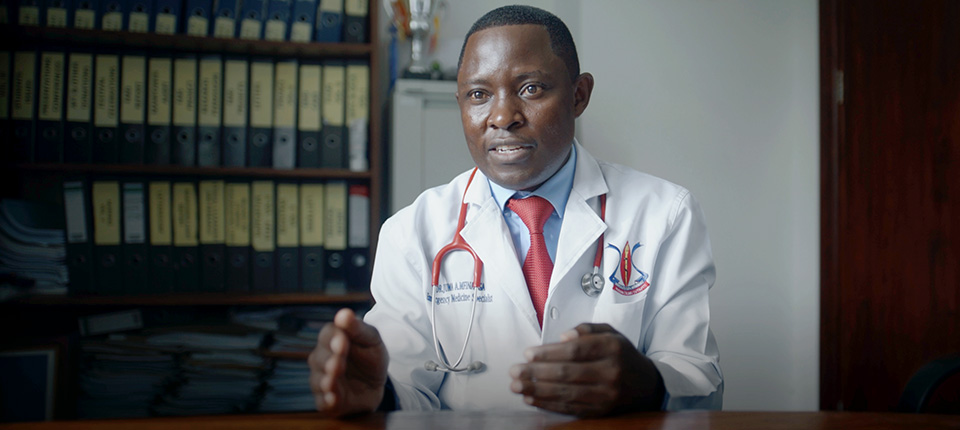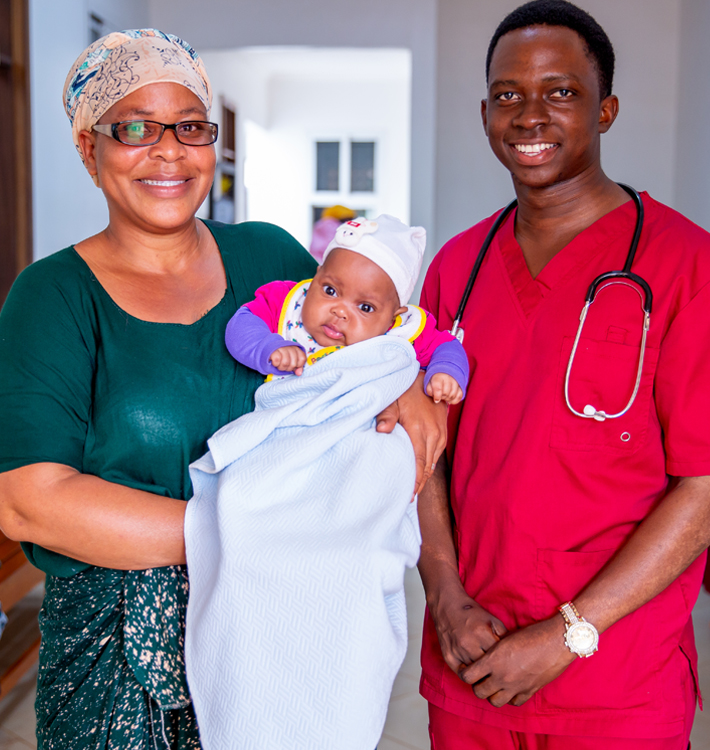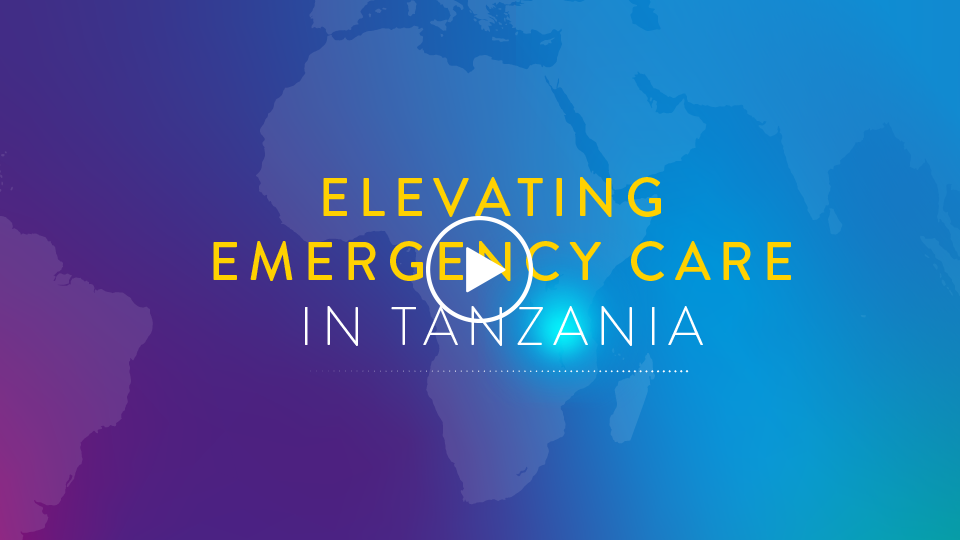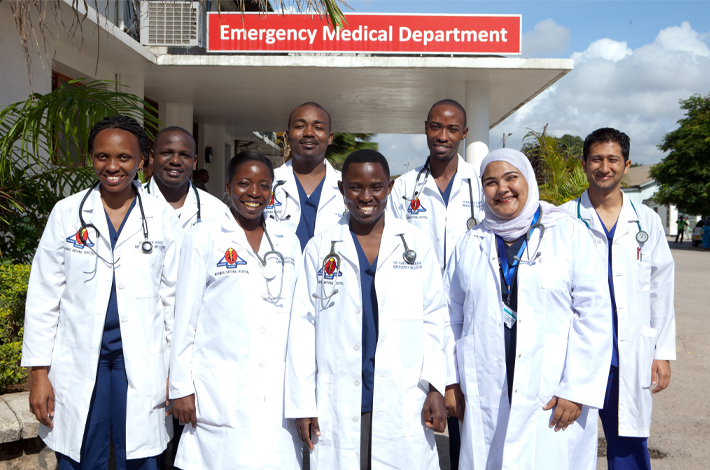
Transforming emergency care in Tanzania
Ten years ago, pioneers helped introduce emergency medicine. Now, they care for 1.3 million people.
Sep. 20, 2024
- Copy Link
- Share on X
- Share on Facebook
- Share on Linkedin
Debora Magembe didn't know what to do. Heavy rains blocked roads from her home in Bantu village in Tanzania to the city of Tanga. While she would have been fine to stay home any other night, her baby had other plans.
The 39-year-old was pregnant with a breech baby and needed to deliver at a more advanced health center in Tanga due to the risk of complications.
Then, Magembe's mother remembered she had heard about a local health clinic, called a village emergency dispensary, that recently opened within walking distance of her home. Together, the two women rushed to the dispensary, where Dr. Ally Ramadhan greeted them. Thankfully, with Ramadhan’s help, Magembe was able to safely give birth to a healthy baby girl named Zalda.
"I don't think I would have survived the delivery if the emergency dispensary hadn't been available," she says. "My family and I are so thankful that we were able to get the care we needed to give birth to my healthy baby girl!"

Debora Magembe (left) and her baby girl Zalda, together with Dr. Ally Ramadhan.
Before 2010, emergency care was virtually non-existent in Tanzania, even in bigger cities. And in rural villages like Bantu, there was little to no medical care available at night, or when roadways are washed out during the long rainy season known as the Masika.
Now, a concerted effort between the Tanzanian government, Abbott and its foundation Abbott Fund has improved access to quality care for families in Tanzania.
Creating a New Vision of Medical Care in Tanzania

Abbott Fund has worked with the Tanzanian government since 2000 to strengthen the country's healthcare system and communities. In 2008, after upgrading outpatient care and completing a nationwide hospital lab modernization program, government officials approached us to start a new project: introducing emergency medicine in Tanzania.
In 2010, the government of Tanzania and Abbott Fund opened the country's first full-capacity Emergency Medicine Department (EMD) at Muhimbili National Hospital in Dar es Salaam, the largest public hospital in Tanzania.
To ensure the department would be self-sustaining, it needed doctors and nurses as well. Abbott Fund and the Muhimbili University of Health and Allied Sciences (MUHAS) leadership worked with a consortium of global emergency medicine experts to launch the first emergency medicine training program in East Africa, with the first class of pioneering residents beginning their education the same year.
A New Generation of Leaders
"I had never heard of emergency medicine before. I'd only heard of the 'ER' TV show," says Dr. Hendry Sawe.
In 2009, Sawe, a recent medical school graduate, planned to start a gynecology residency training program. But then his friend, Dr. Juma Mfinanga, told him about a new emergency medicine training program opening at Muhimbili.
Curious about this emerging field, Sawe applied for a position to work in the newly built EMD at Muhimbili. Working in the EMD changed his early career goals, having seen the impact emergency medicine had on patients. "After a few months, I knew this is what I wanted to do."
In 2010, Sawe went on to join the residency training program in one of eight spots in the first emergency medicine class.
Emergency medicine physicians from leading global academic institutions went to Tanzania to provide clinical training to Sawe and his colleagues. Additionally, the classmates traveled to the U.S. to shadow emergency medicine doctors and conduct research.
"I was able to research the presentation and management of acute, chronic diseases, particularly sickle cell disease. These areas of research are significant for me, as Tanzania ranks fourth in the world for the number of sickle cell births," he says.
Sawe's friend, Mfinanga, also saw this training program as an opportunity to help transform the health of his fellow Tanzanians.
"I went into medicine because, from a young age, I wanted to do something that could save lives. When I started my training, that's why I wanted to do pediatrics or surgery. But by choosing emergency medicine, I could save even more people," Mfinanga says.
After three years of training, Sawe, Mfinanga and their six other classmates graduated in 2013, taking their learning in emergency medicine to hospitals and clinics across Tanzania and around the world – while "paying it forward" by training the next generation of emergency medicine leaders.

In 2013, the first class of emergency medicine residents graduated in Tanzania.
A Decade of Dedication
Emergency medicine in Tanzania has transformed in the decade since the first class graduated.
Today, Mfinanga serves as the Head of EMD at Muhimbili. In his role, he's seen firsthand how an emergency medicine department can positively impact the health of a community.
"Every day, we could touch the lives of mothers, fathers, children. You don't know who they will be. You could be saving the life of someone who will greatly impact the world. That is powerful," he says.
Soon after opening the department, Abbott and Tanzanian health officials saw immediate results. Within the first two years, there was a 40% decrease in mortality at Muhimbili.
As news of the new emergency medicine department and its quality of care spread throughout the region, patients from all over showed up for critical care. Each year, the EMD sees more than 50,000 patients, regardless of their ability to pay. As more patients with medical insurance came, Abbott Fund helped the hospital create a billing unit with accountants, social workers and cashiers to process insurance claims.
As a result, the EMD went from donor-funded to financially self-sustaining. To date, the emergency medicine department has generated nearly $2.5 million in surplus revenue, which allows the facility to continue to offer free or subsidized care to most patients and reinvest in strengthening broader hospital operations.
The positive impact of the MUHAS training has expanded as well. Since 2013, 88 specialist emergency physicians and more than 6,000 nurses, paramedics and other healthcare professionals have been trained by a Tanzanian-led team.
"We're not only training nurses and doctors. We are training non-medical personnel all over the country. By training all these people, we are impacting the lives of millions in our country," Mfinanga says.
Looking Ahead to the Future
Mfinanga hopes to continue expanding emergency medicine's reach to the remote areas of Tanzania, like where he grew up.
"I grew up in a rural area near Kilimanjaro. The idea of being a doctor wasn't something I thought would be possible. I hope that my work training and leading the emergency department can inspire kids like me to be the future leaders in this field," he says.
He often discusses this vision with his friend Sawe, who was the head of EMD training at MUHAS and worked at the EMD before serving in his current role as the executive director of Abbott Fund Tanzania. Over the years, the pair have worked closely to improve the quality of hospital emergency care.
Together, they founded the Emergency Medicine Association of Tanzania (EMAT), a national network of emergency medicine providers that conducts quality training and research.
Along with their classmates, who celebrate the 10-year reunion of the first emergency medicine class in 2023, they serve as leaders in the field. Dr. Philip Koka remains at Muhimbili, working closely with Hendry and Juma in the emergency medicine department. Dr. Esmail Sangey serves as head of the emergency department at a private hospital in Dar es Salaam, and Dr. Mgalula Sifaeli practices emergency medicine in Botswana, following years at Muhimbili. Dr. Shaina Yusuf shares her emergency expertise operating a private rehabilitation facility in Tanzania. Dr. Faith Ringo emigrated to the U.S. following years of practice in Namibia.
Sadly, Dr. Upendo George, a leading pediatric emergency doctor from the class of 2013, passed away in 2020. Her legacy lives on through her classmates' ongoing commitment to improving the health of Tanzanians. You can find out more about Dr. George and her extraordinary life here.
Expanding the Impact
Based on the success of the EMD at Muhimbili, Abbott Fund opened eight more emergency medicine facilities across Tanzania, in Mbeya, Arusha, Dodoma, Msoga, Tanga and Bantu Village in Mkinga, where Debora Magembe gave birth to Zalda. These emergency medicine departments span the spectrum of care across Tanzania, from the national hospital, to regional and district hospitals, to the village level.
Led by Dr. Juma Mfinanga at Muhimbili and other residency graduates, these EMDs have served 1.3 million patients.
And now, the Tanzania government is further broadening the impact, opening more than 100 new emergency EMDs in communities across the country.
The result is powerful: In the future, more people like Magembe will be able to seek treatment when they need it – no matter the weather.
This story was originally published on Dec. 12, 2023 and updated on Sept. 20, 2024.
For the latest on Abbott’s life-changing technology, get updates directly in your inbox.